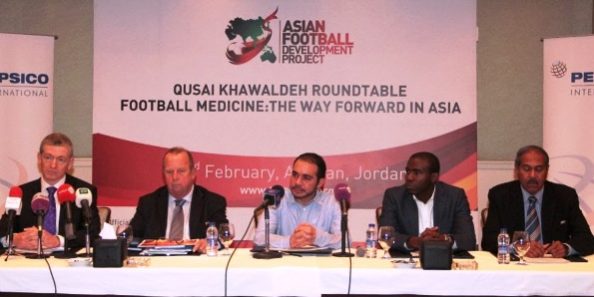DILI (25 Feb 2014) – The Asian Football Development Project announced this week their recommendations on football medicine following the ‘Qusai Khawaldeh’ roundtable discussion in the Jordanian capital.
The discussion was chaired by FIFA Vice President representing Asia and founder of the Asian Football Development Project (AFDP) HRH Prince Ali Bin Al Hussein.
The ‘Qusai Khawaldeh’ roundtable, named after the young Jordanian Under-22 national team player who tragically passed away during a match in November 2013, witnessed the participation of international experts on medicine and football medicine in particular to discuss the challenges facing football associations and clubs in Asia when similar medical emergencies occur on the pitch.
English footballer Fabrice Muamba shared his experience with cardiac arrest where he collapsed dramatically at a Premier League match in March 2012. The British cardiologist who saved his life, Dr. Andrew Deaner, led the discussions which included in-depth presentations by a number of international experts including Chairman of the Medical Committee at FIFA and UEFA Dr. Michele D’Hooghe, Head of the AFC Medical Committee Dato’ Dr. Gurcharan Singh, Dr. Jonathan Tobin and Dr. Sam Mohiddin who provided their perspective as physicians who work with the Football Association as well as the English Premier League.
The participants prescribed recommendations for football stakeholders and medical services to adopt to not only save lives of football players on the pitch but also to prevent similar occurrences from taking place on the field of play. The recommendations included five main categories as follows:
Administrative
– Establishment of a functional Medical Committee at all Member Associations as a requirement by FIFA and AFC.
– Establish minimum qualifications for medical personnel to ensure effective medical services
– Work with governments to get more involved in health and sport
– Include minimum requirements for clubs (under Club Licensing)
– Engage medical partners to ease the financial burden (or provide services/equipment)
Prevention
– Establish effective screening procedures at all levels and make it mandatory at both the club and national team levels
– Screening is crucial but also expectations must be tempered
– Access to medical records for players, referees, and coaches
– Physical clinical examinations of players, referees, and coaches
Education and Training
– Proper training of medical staff at the national level and also at the club level
– Establish campaigns to raise awareness using role models (particularly players)
– CPR training through partners (e.g. Red Crescent, Red Cross) for medical and non-medical personnel
– Use of modern technology through video and other media
Infrastructure
– Easy access to defibrillators
– Easy access to advanced treatment
– Easy access for emergency responders inside stadiums and training sites
– Access to equipment; ambulances and related
– Establish Standard Operating Procedures for all stakeholders
Research and Data Collection
– Encourage national and regional research projects to have more data available with regards to sport athletes
– Empower Medical Committees at the Member Association level to do their own research
– Partner up with national and/or regional health institutes for such research projects
– Mandating reporting of sudden deaths by Member Associations to FIFA
To conclude the sessions, Prince Ali thanked the participants for devoting their time and knowledge to support this mission and commented on the outcomes, saying: “We believe these recommendations will provide Asian associations and clubs with the direction they need to develop guidelines that will hopefully contribute towards lowering the number of deaths and injuries on the football pitch. The wellbeing of our players is and will always be our number one priority.”
Muamba commented: “It’s been a great discussion with a very important message to pass on to all players and stakeholders in football; proper medical tests and the development of healthcare in football can and does prevent injuries and save lives.”
Dr. D’Hooghe said: “Such efforts are an enormous step forward in the evolution of football medicine especially with the amount of experience and knowledge shared around the table today. We arrived to the conclusion of many important ideas that can highly improve medicine in the field of football in Asia.”
Speaking on behalf of AFC, Dato’ Dr. Singh commented: “The meeting was highly productive and the guidelines, if implemented, can play a big role in the development of healthcare of our players in Asia.”







